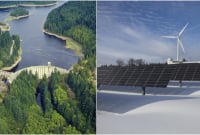Support strong Canadian climate journalism for 2025
In the last federal election, every major party embraced the language of net-zero by 2050. Given how effectively energy and climate have worked as political wedges, it was a promising shift in rhetoric. Canadian politicians have built entire campaigns around promises to fight energy infrastructure and climate policies. In recent years, incoming governments have largely delivered on those promises.
That consensus around net-zero looks all the more fragile after Erin O’Toole’s ouster as Conservative leader. This development isn’t an outlier. In the history of federal politics, wedging over energy and climate policy is the rule, not the exception. For a new report for the University of Ottawa’s Positive Energy initiative, I interviewed 50 experts to better understand this history, and assess how to make ambitious energy and climate policy more durable and less vulnerable to partisanship.
It should come as no surprise that politics have played an outsized role in polarizing key energy and climate issues. Based on our interviews, partisan politics appear to impose three key limits on consensus-building. Let’s unpack them one by one.
Toxic partisanship
The first limit is toxic partisanship. The word partisan carries a lot of baggage, but politics is a team sport and there really is no good alternative to picking a team. What really matters is how we feel about the other teams. The toxicity challenge extends beyond energy and climate policy, but we shouldn’t understate the risks it poses to Canada’s net-zero ambitions.
Incivility in partisan environments such as legislatures trickles down. Just as our political leaders play an outsized role in perpetuating this toxicity, they have equal power to course correct. Civility should go without saying, but seeing more politicians open to collaboration would be a massive step in the right direction. Non-partisan actors can facilitate these efforts. Canada is a big, diverse place. If we can’t consistently and respectfully disagree without losing sight of the big picture, net-zero is a pipe dream.
Us versus them
Second is “us versus them” mindsets, which now pervade our politics. Diffusing us versus them requires an understanding of what activates this mentality to begin with. Us versus them is a natural strategy in our winner-take-all political system, and rapid advances in the fields of social and political psychology have provided a roadmap for anyone looking to confuse, stoke anger, or create enemies. Without changes to Canada’s political incentives, our only option is to resist the strategic creation of in-groups and out-groups. Mainstreaming an understanding of how us versus them is used to divide and enflame is a crucial task.
False polarization
Third is false polarization, which refers to the mistaken beliefs about how polarized different groups actually are. Positive Energy’s ongoing public survey work suggests many Canadians have a distorted view of where their neighbours stand on climate action. This creates an unfortunate feedback loop where we become angry or alienated based on what we think our partisan and ideological opponents think. In practice, about two-thirds of Canadians self-identify as ideologically moderate. While moderates are generally less inspired to speak out or take action, enough Canadians seem to agree on enough of the basics to make headway.
We have multiple avenues to address false polarization. More dialogue, more nuance, more honest brokering, less pre-emptive judgment, more collaboration across partisan lines, less categorical thinking and less oversimplification of opponents’ viewpoints are all important elements.
But what about people who don’t agree and don’t want to? Among the 50 experts we interviewed, 13 indicated they aren’t necessarily interested in building bridges or fostering greater consensus. This perspective reflects the challenge of polarized contexts: a minority who either believes that certain ideological or political positions are unworthy of negotiation or compromise.
The good news is that there appears to be common ground on several key initiatives across these divides. Among the participants we interviewed, low-emissions tech, market-based policies like industrial carbon pricing, and the lodestar of net-zero appeal for a variety of different reasons. Actors frustrated with their ideological counterparts can still make progress; we don’t necessarily have to agree on the why to agree on the how.
Another key challenge is that 2050 targets are far enough away that pledges from some governments and companies should rightly be seen as empty promises. These pledges and the actions behind them deserve deep scrutiny. But if researchers, analysts and advocates take net-zero pledges at face value and provide serious, sober advice about the tradeoffs that await, the solution space will become clearer, faster.
Engaged actors had the beginnings of an important political consensus to work with, but time is short to build around that consensus. More than any single policy, depoliticizing climate action remains an urgent task.






Comments